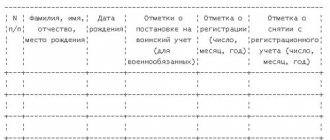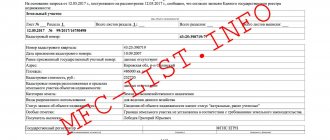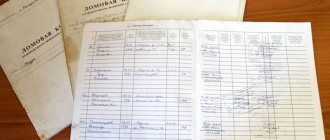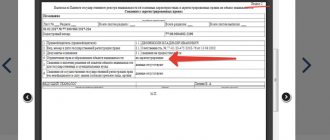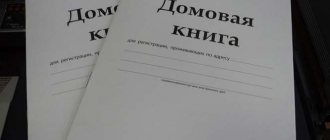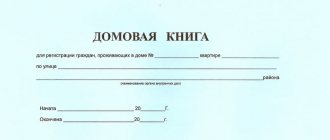Household ledger and obtaining an extract
Legal regulation of the conduct by citizens of personal subsidiary plots (LPH) is carried out on the basis of In accordance with Art. 8, accounting of farms is carried out by local governments in household books. Citizens provide all information entered on a voluntary basis.
The rules for maintaining books and issuing extracts have been approved. This regulatory act indicates that an extract from the household register for a land plot may contain any list of information and is issued for any purpose.
Entries in the household ledger are made only by officials responsible for their maintenance and safety. Each household is assigned a personal account. In addition, the book states:
- Full name and passport details of citizens running subsidiary farming;
- address and technical condition of the facility;
- information about citizens living together with the head of the household, indicating their relationship (according to the owner);
- area of land plots and information about ownership or use rights;
- information about farm animals;
- availability of machinery, equipment and vehicles.
There is a common misconception that a household ledger and a house ledger are one and the same. However, these documents are intended to record completely different information.
Until 2020, only information about the registration and deregistration of citizens living in the premises was entered into the house register. After it came into force, the registration of house books is not provided for by law. This has been replaced by the recording of registration information in the Mir system database.
After amendments were made to Art. 49 » the procedure for registering real estate transactions for which there are no title documents has been significantly simplified. Now you can register a plot of land if you have an extract from the household register.
The procedure for providing information is formalized by the regulations of local authorities, therefore in different regions the application form, documents and terms of issue may differ slightly.
As a rule, to register ownership, the following information is included in the document:
- information about the citizen-head of the subsidiary farm;
- address of the site and its area;
- details of the entry in the household ledger;
- information about the documents on the basis of which the entry was made in the book.
Letter from the Ministry of Economic Development of the Russian Federation dated December 18, 2020
According to paragraph 33 of the Instruction on the procedure for allocating land plots for individual housing construction on the territory of the RSFSR, approved by order of the RSFSR State Construction Committee for Construction Affairs dated December 19, 1996 N 86, documents for the right to build and use a plot of land in rural areas allocated from collective farm lands and a state farm or other agricultural enterprise, were: a resolution of the general meeting of collective farm members (meeting of authorized representatives), an order from the director of the state farm or the head of another agricultural enterprise; land allotment act; project for the development of a personal plot of land and a building permit issued by the district architect; in the land cord book, the use of a land plot on the lands of collective farms, state farms and other agricultural enterprises was registered based on the fact of such use.
Interesting to read: Sample of filling out the T2 personal card form
Thus, if the source of information about a previously registered land plot provided for running a personal subsidiary plot is a household register, information about a previously registered land plot is entered into the State Property Committee on the basis of an extract from the household register. Entering into the State Property Committee information about previously registered land plots on the basis of archival extracts, archival copies of extracts from household and land cord books is not provided for by current legislation.
Simplified registration procedure or “dacha amnesty”
According to the law, the right to real estate can be registered only if there is information about it in the State Real Estate Cadastre - this must be a boundary or technical plan. which simplified the procedure for registering property for private household plots, gardening, vegetable gardening, individual garage or housing construction, in everyday life it became known as the “dacha amnesty.”
The changes affected the procedure for registering land plots received before October 30, 2001, that is, before the introduction of the Land and Town Planning Codes of the Russian Federation:
- Mandatory land surveying has been abolished, documents are drawn up within the actual boundaries agreed upon with the neighbors.
- The right of simplified registration also applies to buildings erected without approval and unfinished objects.
- To register, it is enough to provide any document that confirms the use of the site.
- Heirs can acquire ownership free of charge.
- When selling the plots listed above, the new owner has the right to apply for simplified state registration.
This procedure improved the situation not only of property owners. These changes are also beneficial to the state - this will improve the quality of use and preservation of land, and the taxes paid will replenish the budget.
Order of the Federal Service for State Registration, Cadastre and Cartography of March 7, 2012
*(2) Information about the details of an identity document and the address of permanent residence or primary residence of the citizen who owns the land plot (the previous owner of the building (structure) or structure located on this land plot) is not filled in in the case of state registration rights to a land plot in accordance with paragraph 7 of Article 25.2 of the Registration Law.
We recommend reading: Is it possible to put a child on a waiting list for kindergarten without registration?
On September 1, 2006, amendments came into force allowing citizens to register rights to certain real estate objects in a simplified manner. This is the so-called dacha amnesty. It also includes land plots provided for personal subsidiary plots.
Requesting information from the household ledger
Information about the existence of a subsidiary farm is contained only in household books, which are considered documents of primary administrative registration of the population. This information about whether a citizen has a plot of land, livestock, transport or other property for farming is used not only for the generation of official statistics. The extract can be obtained and used as a title document for a land plot.
The book is maintained both electronically and on paper. When using software and electronic media, all information is certified with a digital signature of officials and members of farms.
If the program does not provide for the use of electronic digital signatures, the book is kept on paper in A4 format.
Documents are stored for 75 years, so you can get an extract of the right to a land plot not only for recent years.

Right to receive an extract
The established Procedure for maintaining household books states that each member of the household has the right to receive an extract for any needs. This category of citizens includes family members who jointly manage the household, both present and temporarily absent. All relatives are registered according to the head of the family, indicating the degree of relationship:
- mother, father, wife, husband;
- daughter, son, sister, brother;
- son-in-law, mother-in-law, etc.
Thus, only family members listed in the household register have the right to receive an extract. The exceptions are heirs who provide a supporting document and buyers of subsidiary plots.
Where can I get an extract?
In accordance with Art. 5 regulating the provision of state and municipal services, each applicant has the right to timely receipt of public services, including extracts.
The following have the right to issue a document at the location of the land plot for simplified registration of property or other purposes:
- rural administrations;
- village authorities;
- land management committees;
- territorial departments of the MFC.
The sample application is approved by the Administrative Regulations for the provision of municipal services separately in each region, but the general form must comply with the requirements of Art. 7
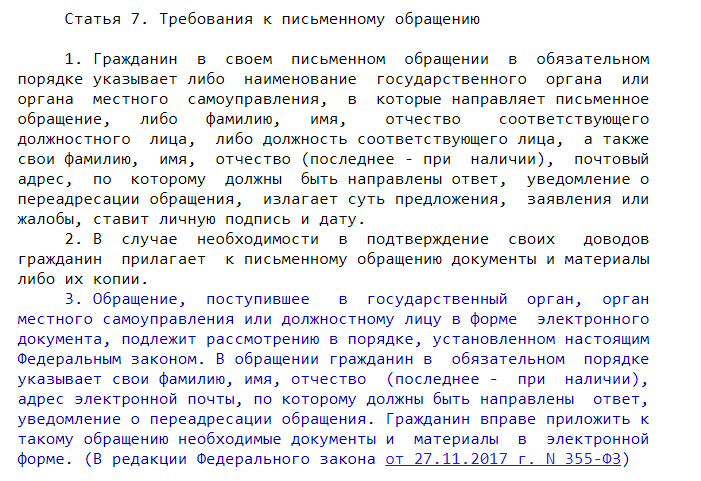
In cases where the village council does not give the correct extract from the household register to a citizen who has the right to receive it, the latter can appeal these actions in accordance with.
Documents for issuing an extract
Since officials are obliged to maintain the confidentiality of information, as well as in accordance with the Procedure for maintaining a household book, information is provided to a member of the household who has presented an identity card:
- passport of a citizen of the Russian Federation;
- international passport;
- sailor's passport or military ID;
- temporary certificate issued before issuing a passport;
- birth certificate of a citizen under 14 years of age.
In addition, each applicant signs consent to the processing and storage of personal data, in accordance with. The authority to obtain information from the household ledger can be transferred to third parties only by issuing a notarized power of attorney.
Contents of the extract
Clause 34 of the Procedure indicates the possibility of issuing an extract from the household ledger in the following forms:
- free form for any list of information contained in the book;
- in the form of a photocopy of sheets of the household ledger;
- in the form of an extract confirming the citizen’s right to a land plot, approved by .
For the purpose of state registration of rights to a land plot, in accordance with Art. 49 of the Law of the Russian Federation dated July 13, 2015 No. 218-FZ “On state registration of real estate”, the last specified version of the extract is issued.
A certificate for residential premises is issued arbitrarily or in a form established by regional institutions authorized to maintain this documentation.
The applicant can also see a sample extract from the household register for a residential building at the territorial department of the MFC. Typically, the document contains the following information:
- personal account number and address of personal subsidiary plot (LPH) - street name, house and apartment number;
- Full name of the head of the private household plot and those living with him;
- degree of relationship of family members with the head of the private household plot.
To obtain a loan or loan, the owner may need documentary evidence of the number of agricultural machinery, equipment, animals, birds or bee colonies owned by the owner. In this case, the form of an extract from the household ledger will be a photocopy of the sheets of the document.
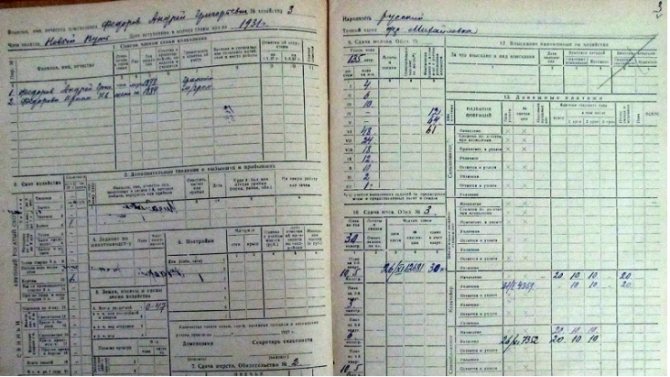
Regardless of the form, the extract must be issued in 2 copies, which are originals. Each of them is signed by the head of the local government body, the official responsible for maintaining the book, and certified by a seal.
The cost of the extract and the time it takes to produce it
There is no fee for providing information from the household ledger. The document preparation time depends on the regional Administrative Regulations for the provision of services, for example:
| Resolution of the Administrative Municipal Formation "City of Saratov" dated April 13, 2016 No. 917 | Resolution of the Administration of Lipetsk dated 02.02.2017 No. 101 | Resolution of the Tula city administration dated June 29, 2012 No. 1744 |
| Issuance of an extract from the household ledger – 20 days | Duration – 25 days | Duration – 30 days |
Although the deadlines are regulated by regional regulations, the maximum time for processing an extract or a reasoned refusal should not exceed 30 days from the date of receipt of the written application. This period is specified in Art. 12 of the Law of the Russian Federation dated May 2, 2006. No. 59-FZ “On the procedure for considering citizens’ appeals.”
Grounds for refusal
By submitting an application for an extract from the household register, the applicant may receive a refusal in cases provided for in the Regulations for the provision of services, which are approved in the region.
For example, the established grounds for refusal are:
- lack of requested information in the book;
- an application submitted by a non-heir requesting an extract for the deceased head of the PLH;
- lack of supporting documents;
- written refusal of the applicant.
Refusal will be received based on the submission of an application that:
- cannot be read;
- not submitted in the prescribed form;
- contains errors and conflicting information;
- not accompanied by the necessary documents;
- filed by a citizen who does not have the right to request this information.
The refusal is issued in writing, indicating the reasons. Although regulations provide grounds for refusal, in cases where the applicant considers the actions of officials unlawful and violating his legal rights to obtain the necessary information, he can file a complaint in accordance with Art. 11-2 of the Law of the Russian Federation of July 27, 2010 No. 210-FZ and Decree of the Government of the Russian Federation of August 16, 2012 No. 840.
PRO new building 7 (499) 450-27-46 (Moscow)
- Details of the household ledger and documents on the basis of which changes are made to it.
- With the land plot itself: its area and address, the category to which it belongs.
- Type of property right.
- Passport details of applicants. We are talking not only about the full name, but also about the residential address of the person who plays the role of owner.
We recommend reading: Free vitamins for pregnant women
For four years between inventories, information about objects that were entered earlier is verified. If there are changes, they are entered in the appropriate columns. Every year they update the list of citizens who live on the territory of the land plots and also have official registration there.
